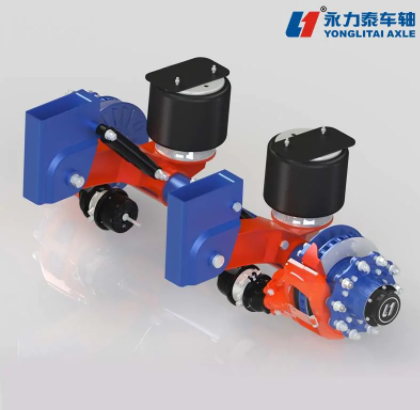Introduction:
Embarking on a journey with a trailer in tow involves more than just hitching it to your vehicle and hitting the road. One of the critical aspects that often goes overlooked but plays a pivotal role in ensuring a smooth and safe ride is the trailer suspension. With a myriad of trailer suspension types available in the market, choosing the right one can be a daunting task for both seasoned haulers and first-time trailer owners. In this guide, we'll delve into the world of trailer suspensions, unraveling the complexities and shedding light on key considerations to help you make an informed decision.

Understanding the Basics:
Before delving into the diverse array of trailer suspension types, it's essential to grasp the fundamental role of a trailer suspension. Essentially, the suspension system acts as the intermediary between your trailer and the uneven terrain, absorbing shocks and vibrations to provide a smoother and more stable ride. A well-chosen suspension system not only enhances the overall towing experience but also safeguards your cargo from the jolts and bumps encountered on the road.
Trailer Suspension Types:
Leaf Spring Suspension:
One of the traditional and widely used suspension types, leaf springs consist of multiple layers of flexible steel strips bundled together. Known for their durability and cost-effectiveness, leaf spring suspensions are adept at handling heavy loads. However, they may not offer the same level of comfort as some other options.
Torsion Axle Suspension:
Torsion axles utilize a rubberized suspension system, providing a smoother and quieter ride compared to leaf springs. These axles are low-maintenance, as they lack traditional springs and shock absorbers, making them a popular choice for those seeking hassle-free towing.
Air Suspension:
Featured content:Questions You Should Know about modular low bed semi trailersWhy is Fence Semi Trailer Better?Offering superior adjustability and ride comfort, air suspensions use airbags to bear the load and provide a customizable level of support. This type of suspension is particularly beneficial when dealing with varying loads or when seeking a smoother ride in challenging terrains.
Independent Suspension:
Unlike the more common solid axle configurations, independent suspension systems allow each wheel to move independently. This results in improved stability, better handling, and enhanced shock absorption, making it an ideal choice for those who prioritize a smoother and controlled towing experience.
Key Considerations When Choosing Trailer Suspension:
Payload Capacity:
Understanding the weight your trailer will be carrying is paramount. Different suspension types have varying payload capacities, so matching the suspension to your specific load requirements is crucial for optimal performance.
Terrain and Usage:
Consider the type of terrain you'll be traversing and the primary use of your trailer. Whether it's long-haul highway journeys, off-road adventures, or a combination of both, tailoring your suspension choice to the anticipated conditions is essential.
Budget and Maintenance:
Assess your budget constraints and weigh them against the long-term maintenance costs of different suspension types. While some options may have a higher upfront cost, they may prove more cost-effective in terms of durability and maintenance over time.
In the upcoming sections of this guide, we will delve deeper into each trailer suspension type, exploring their pros and cons, and providing insights to help you make an educated decision tailored to your specific towing needs. So, fasten your seatbelt as we embark on a journey to demystify the world of trailer suspensions, empowering you to choose the perfect system for a safer and smoother ride.


Comments
Please Join Us to post.
0